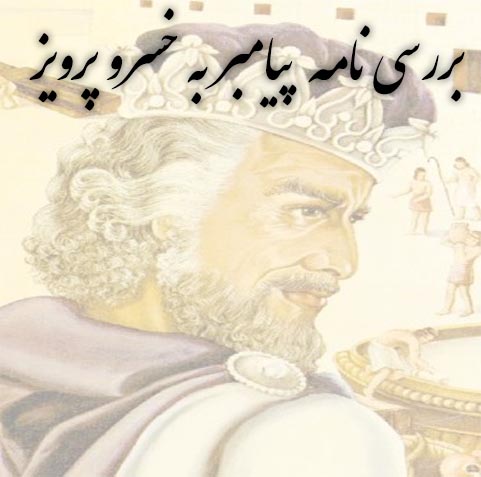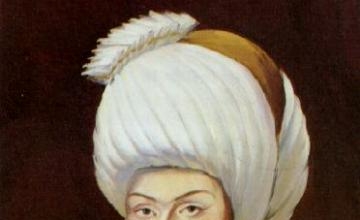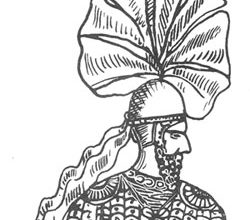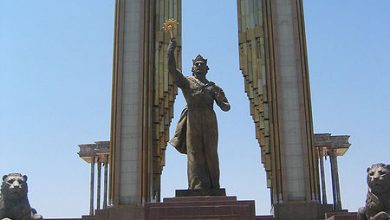Prophet's letter to (Khosrow Parviz)

To examine the Prophet's letter to Khosrow Parviz we pay
It is mentioned in many historical documents that The Prophet had a special interest in Iranians And some historians are of the opinion that the Prophet's letter has no historical reason and there was no reason for the Prophet to send a letter to Khosrow Piraviz.!
Can it be said with certainty that there was a letter writing at all, or that there was a meeting? Khosrow Parviz It was not acceptable, did the highly social situation of the Sassanids allow Khosrow Parvez to deal with an angry envoy?
What was the reason that Khosrow Parviz, the Shah of Iran, did not kill the Arab envoy and let him go? If Khosrow Parviz According to Tabari, they used to order the king of Yemen to bring the Prophet of Muslims. Do Yemeni envoys enter into a discussion with Prophet Muhammad without any aggression? What is the reason for these discrepancies?
The story of Khosrow Parviz tearing up the Prophet's letter is perhaps nothing more than a legend
Some researchers believe that the Prophet of Islam did not write a letter to any of the kings and that what they wrote in history was made by the hands of the caliphs to justify their attacks on various areas.. They give various reasons for their talk, which of course is not our discussion.
We are talking only about Iran and Khosrow Parviz
All of us the story of tearing the letter of the Prophet by Khosrow Parviz We have heard and perhaps in the opinion of many of us, this event is assumed to be a historical fact, but it must be accepted that there are many ambiguities in this story and even some historians have narrated another event..
Although some people believe that the letter of the Prophet to Khosrow Parviz is still valid and sound, available and available; And according to this topic, the story of tearing the Prophet's letter by Khosrow Parviz reject. But this issue also faces many ambiguities and cannot be definitively accepted. In this article, we will examine this issue based on historical evidence.
what is famous…
In many books and articles citing sources such as Tabari They tell this story :
In the sixth or seventh year of Hijri, the Prophet of Islam(ص) In addition to a letter addressed to Khosrow ParvizHe called him to Islam.(The text of the letter follows )
because the letter of the prophet Khosrow They read it, he became angry that how dare the prophet put his name before the name of the emperor of Iran, so Khosrow Parviz tore the letter and sent it to the governor of Yemen.- called "Bazan" – He wrote that he was a descendant of the Sassanid government: I was informed that a man from Quraysh in Makkah is claiming prophethood. Send two of your senior officers to him to inquire about his condition, arrest him and send him to me..
Perhaps we have come across such cases several times in the historical books of education and also in the books of general courses of universities; But has it really been like this?!
General story
If we ignore the details of this story and look at the generalities of this story in the words of all the historians who have narrated this story, three stages can be noticed in this event.:
– Prophet of Islam to Khosrow Parviz sent a letter.
– Two envoys from Iran by Bazan(The governor of Yemen) They went to the Prophet.
– After the return of the messengers from the Prophet, Bazan became a Muslim and other Persian sons living in Yemen also became Muslims with him.
It should be noted that at that time, Yemen was considered part of Sassanid Iran.
Story details
Historians like Khosrow Parviz's story of tearing the Prophet's letter Tabari(3rd and 4th centuries A.H)، Ibn Balkhi(6th century A.H)، Ibn Athir(6th and 7th centuries A.H), And… have quoted.
The Prophet's letter has often been narrated like this :
The name of God the Merciful
From Muhammad, the Messenger of God, to Chosroes, the great knight. Peace be upon those who follow the guidance and believe in God and His Messenger and testify that there is no god but God alone with no partner and that Muhammad is His servant and Messenger. I call upon you with the supplication of God, for I am the Messenger of God to all people, to warn whoever is alive, and the word is justified against the unbelievers.. Peace be upon you . If you refuse, then the sin of the Magians is upon you.
In the Name of Allah, Most Gracious, Most Merciful
From Muhammad(ص) God's prophet to the great king of Iran. Peace be upon the one who follows the right path and believes in God and His Messenger and testifies that there is no God but the One and Only God and Muhammad(ص) He is his servant and messenger. I call you to accept the religion of God Almighty, because I am his messenger to all the worlds to convey his message to all unbelievers.. So believe in order to be saved, and if you don't, the sin of the wise men will be upon you!»
[Of course, it is associated with small changes in some sources]
Pay attention to the text below:
Because I am his messenger to all the worlds to convey his message to all unbelievers.
What to expect from Emperor of Iran Was he when an unknown Arab person, who has no knowledge of him, calls him an infidel? This question should be asked to those who recognize sources like Tabari and consider this letter as a reason for condemning Khosrow Parvez.…
Details of this story in Tabari compared to sources such as Farsnameh of Ibn Balkhi And Complete history of Ibn Athir fewer Is; while Tabari is older than other sources.
For example, Khosrow Parviz's reason for tearing the letter was not mentioned in Tabari's history and was only mentioned: And Khosrow cut Pimber's letter – Tabari's history, third volume, p. 1142
However, in Farsnameh, the reason for tearing the letter and also Khosrow's aggressiveness to the messenger of the Prophet is mentioned : Parvez was angry with the messenger of the Prophet, peace be upon him, and wrote a letter and said why his name was not written before mine. – Farsnameh of Ibn Balkhi, p. 106
Tabari writes further: After that, Khosrow wrote to Bazan, the ruler of Yemen, that he sent two brave men to this Hijazi man to bring him to me.. – Tabari's history, third volume, p. 1142
It is said that those two people went to the Prophet and the Prophet invited them to Islam. And the Prophet, according to the divine revelation that reached him, predicted the death of Khosrow, and as a result, the messengers told the matter to Bazan, and Bazan converted to Islam with the fulfillment of this prediction.. Tabari's History, Volume III, p. 1143
Uncertainty investigation
As you can see, if we examine the generalities of the story separately from its details, something else is felt, but in addition to the fact that historians do not have the same opinion on these details; If we examine the said details more closely, some ambiguities arise.
Tabari And Jacobean history(3rd and 4th centuries A.H), are the oldest sources that have spoken about the Prophet's letter to Khosrow Parviz.
Interestingly, Yacoubi Another topic has been written about this. He spoke about Khosrow Parvez's answer to the Prophet : and Khosrow [In response to the Prophet's letter] He wrote a letter to him and put it between two pieces of silk and put a piece of musk between them.. When the messenger gave it to the Prophet, [the Prophet] He opened it and took a handful of musk and smelled it and gave it to his companions and said: "We are not needed in this silk and it is not our clothing. You must of course convert to my religion or I and my companions will come to your head, and God's order is more urgent than that, but your letter, so I am more knowledgeable about it than you and in It is so and so" and he did not read it and returned to Khosrow as a messenger – Yaqoubi History, p. 443
However, in many sources such as Mas'udi, Tabari, Balami, Ibn Balkhi, Ibn Athir and Ibn Khaldun, it is stated that after the letter of the Prophet to Khosrow Parvez, Khosrow ordered Bazan to send two representatives to Medina. (Or he himself sent from Mada'in) As mentioned, in the sources that brought the incident of tearing the Prophet's letter by Khosrow Parvez; It is said that these two people went to Saudi Arabia to arrest the Prophet or to scare him. But it should be noted that sending only two people to arrest someone like the Prophet in the Arabian Peninsula seems very illogical and unreasonable, and it should be investigated what benefit the arrest of the Prophet could have had for Khosrow?! On the other hand, in the history of the Sassanids, we often find ambassadors sent to other countries for talks, and according to Yaqoubi's narrative, sending these people is more like sending people to talk.. Some of the cases that they have written about the behavior of the two messengers and the Prophet's reaction to them do not match the case of the Prophet's arrest in any way, so there are interesting discussions about how to trim the face.:
When those two people came to Pimber, they had shaved their beards and put on mustaches. And Pimber did not like to see them and looked at them and said: "Who told you to do that?"
they said: "Our Lord said so" they meant Khosrow. the prophet said: But my Lord has told me to grow a beard and shave my mustache – Tabari's History, Volume III, p. 1143
Apart from these cases, according to this story, Bazan (Iranian governor of Yemen) who was responsible for handling this issue; He did not arrest anyone and even converted to Islam. It may come to mind that Bazan, with his own plan and contrary to Khosrow's opinion, instead of sending two people to arrest the Prophet, sent them to talk. But it should be checked whether Bazan accepts the risk of disobeying the king or not?! In any case, Bazan is responsible for carrying out the orders that come to him from the Sassanid emperor, and in case of disobedience, he must be held accountable.. There is also a possibility that Khosrow Parviz entrusted the follow-up of this matter to Bazan and gave him full authority in this regard..
If we pay attention to other sources that have quoted the conditions of the Sassanid Empire; Other ambiguities also arise.
All information from various historical sources (Iranian, Byzantine, Armenian, Georgian, Syriac, Egyptian, etc …) About the ceremonies of Tisophon's court, they indicate that these ceremonies were the heaviest examples of their kind in the entire ancient world, and among these ceremonies, the most complex were the ceremonies related to bringing people to the Sassanid emperors, especially during the era of Khosrow Parviz. which required them to go through a real Haft Khwan Rostam, so that even the second-ranking kings were not allowed to do this except by observing this ceremony, and in this case, none of them could get closer to the king than a certain distance.. (In this regard, a comprehensive review can be done Iran during the Sassanid era Arthur Christensen He found that there are many quotes from other western historians who have given reports in this field.)
In such circumstances, it is conceivable that an unknown Arab from the Hijaz desert, on behalf of another Arab who may have been as unknown to the Sassanid court as himself, would appear in the court and give the letter directly to Khosrow Parviz.!!! It comes a little hard.
Some say, the predictions of the Zoroastrian priests during the time of Anushirvan - which coincides with the birth of Prophet Muhammad (ص) It was - and during the time of Khosrow Parviz- which was at the same time as God's prophet – It allows this Arab representative to enter the Sassanid court. Excellent, this is a thoughtful and acceptable statement. But is it true that someone who believes in the prediction of someone being a prophet and ignores important rituals for this matter? How does he deal with that person's letter?! This also seems a bit illogical and a contradiction.
It should be noted that in the Shahnameh, which seems to have been used by Ferdowsi from Iranian sources and the words of the peasants, there is no trace of such a letter, and the story of tearing the Prophet's letter is not mentioned in the Shahnameh, and this is due to the ambiguities of this The story adds.
Ambiguities increase when, by examining the time when the Prophet's letters were sent to other kings, we find that these letters coincided with the years when the Prophet faced important events in the land of Hijaz, and still many Arabs They had not converted to Islam.
In the end, one should ask why the story of tearing up the letter by Khosrow Parviz has received so much attention and became widespread. But the conversion of Bazan to Islam - which was mentioned by almost all the historians who spoke about the tearing of the letter- Has it remained so anonymous? This also adds to the confusion.
Conclusion
Perhaps what has made the story of tearing the Prophet's letter believable in the eyes of some is the pride of Khosrow Parviz. By reading some historical sources, the face that is drawn of Khosrow Parviz is a proud and self-centered face.. This proud and self-righteous face of Khosrow appears in stories like Khosrow and Shirin. But again, there are traditions that do not attribute such a face to Khosrow Parviz.
In general, it must be accepted that the subject of the Prophet's letter to Khosrow Parvez is faced with many ambiguities and none of the narrations can be definitively accepted in this regard.. But if this event is to be mentioned; We should point out contradictory narrations and not neglect to bring the ambiguities and contradictions in a narration. It is better in such a matter where there are conflicting statements and one narrative cannot be preferred over another; Let's just call it "an ambiguous historical issue"..
It is not possible to condemn a person in a court and give him a death sentence based on a vague and of course unproven event; The historical discussion is the same and it should be done with detailed investigations.
Taken from Ahura Campus
Themes:
Muhammad bin Jarir Tabari. Translation: Abolghasem Payandeh. Tabari, TErich Al-Rasl and Al-Muluk. Tehran: Asatir, 1375
Ahmed bin Ishaq Yaqoubi. Translation: Mohammad Ibrahim Aiti. Jacobean history. Tehran: Scientific and Cultural Publishing Company, 1374
Ibn Balkhi. to correct: Guy Listrange, Reynolds Allen Nicholson. Farsnameh. Tehran: Asatir, 1384
Abdul Hossein Zarin Kob. History of Iran after Islam. Tehran: Amir Kabir, 1343, 1362
Thanks from :
Shahnameh of Ferdowsi
Scientific website of Iranian students
Tebayan site







What is stated in the above article and then its conclusion is a general matter that applies to all events and historical issues that are discussed..
Nothing in history is certain and all quotes are from historians and ordinary people.
Personally, I did not catch anything by reading these contents.
Thank you for managing the site
Thank you so much… It is certain that Islamic historians have dealt with the issue with prejudice and stubbornness, as can be seen from their customs and practices.. And Iran is unknown even to them. Iranian civilization and culture is not something that can be easily misconstrued, and Khosrow Provir's action was certainly very correct and logical.… Mohammad had no resume and was an unknown person… It's like you go and claim to be a prophet in front of the head of your office